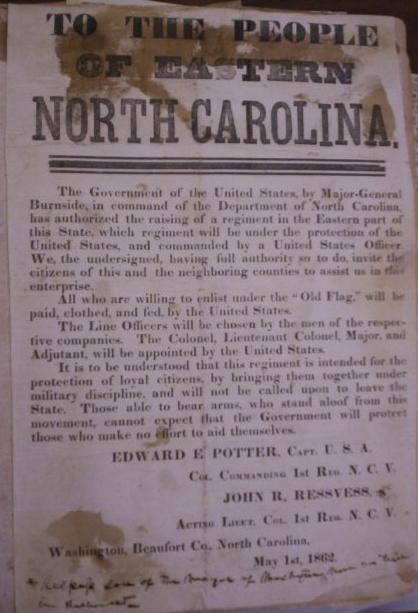Littleton Johnson
(Bertie County)
Featured Character – Divided Allegiances

Union
Recuriting Poster
Courtesy of the Henry Toole Clark
Papers, North Carolina State Archives
The Conscription Act passed by the Confederate Congress
allowed wealthy planters to pay other men to serve in their place as
“substitutes.” On April 1, 1862, Littleton
Johnson from Bertie
County enlisted as a substitute
in Company G, 32nd North Carolina Infantry. Promoted to corporal in November 1862, he
suffered a demotion to private in April 1863.
A few weeks later, the regiment received word of their transfer out of North Carolina to the
Army of Northern Virginia. Possibly
angered about his reduction in rank and serving away from home, Johnson deserted
to the Union Army in May 1863. In
October 1863, Johnson wrote a letter to newly-appointed Union officer Charles
Henry Foster. Johnson offered to raise a
company of Bertie
County men for Foster’s 2nd
North Carolina Union Volunteers. For his
recruiting services, Johnson received a captain’s commission and command of the
new regiment’s Company B. He and his men
became part of the Union garrison in Plymouth. In April 1864, Confederate General Robert F.
Hoke laid siege to the town. As a
Confederate deserter, Johnson feared capture by Confederate forces. After his superior officer ordered all Union
troops to surrender, Johnson told his men to escape by any means possible. Johnson swam across the Roanoke River to
relative safety in the Bertie
County swamps. Together with about twenty other men, he made
his way back to Union lines at Fort
Macon. As an avid supporter of Charles Henry Foster,
Johnson expressed outrage at his commanding officer’s dismissal from the
service in March 1864. On June 12, 1864,
Fort Macon’s provost guard arrested Johnson
for “open and gross violation of discipline and endeavoring to incite mutiny
among the men in camp.” Union officials
discharged him without trial on August 13, 1864. He returned to his farm in Bertie County.
